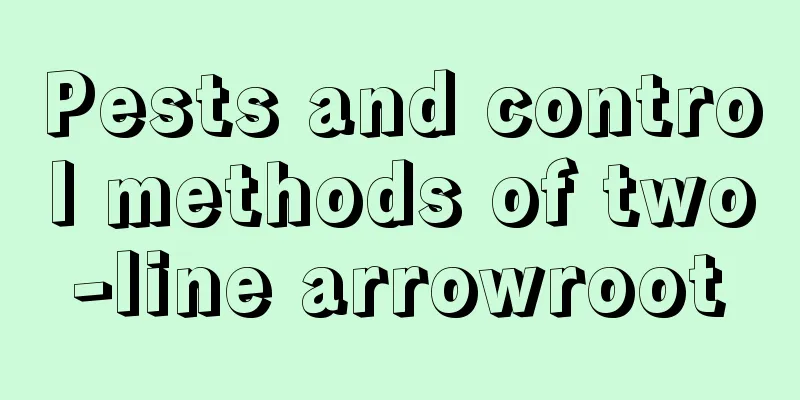Pests and control methods of two-line arrowroot

Pests of two-line arrowroot: scale insectssymptomScale insects are mealybugs with strong reproductive capacity and can reproduce multiple generations every year. May is the peak breeding period. The disease often occurs on the edges or backs of leaves, but it can also occur on the surface of leaves. Scale insects use their mouthparts to pierce the leaves and suck the juice of the two-lined arrowroot. In mild cases, the leaves will turn yellow and become old, affecting the growth of the plant. In severe cases, the leaves will gradually wither and fall off until the entire plant dies. The wounds bitten by scale insects are also easily infected by pathogens. Adult scale insects have a waxy outer shell, so pesticides cannot completely control the pests, making them difficult to control. Prevention and treatment methodsPesticides should be sprayed during the peak nymph stage. At this time, the nymphs have just hatched and the wax on their body surface has not yet formed. It is easier to kill scale insects with pesticides at this time. Use 1000 times diluted 40% oxydemeton-methyl, 1000 times diluted 50% DDT, 3000 times diluted 2.5% cypermethrin for spraying for prevention and control, spray once every 7-10 days, and spray 2-3 times continuously. Pests of two-line arrowroot: Red spider mitessymptomRed spider mites are relatively small and not easy to be found. They are reddish brown or orange in color. Once found, the damage they have caused is often already quite serious. Red spider mites use their mouthparts to absorb nutrients from leaves, causing an imbalance in the plant's water metabolism and affecting its normal growth and development. Red spider mites generally reproduce in an environment with higher temperature and lower humidity, and a single spider will do little harm to plants. Prevention and treatment methodsPlace the plants in a ventilated place, keep the humidity of the environment stable at above 40%, and spray water on the leaves frequently. Pesticides cannot completely kill insect eggs, so adults and nymphs must be controlled after the eggs hatch. You can use 1000 times diluted 20% trichlorodicofol emulsifiable concentrate or 1000 times diluted 40% oxydemeton-methyl emulsifiable concentrate for spraying. |
<<: Common pests of the dwarf ...
>>: Diseases and Pests of Chlorophytum comosum and Their Control
Recommend
When is the best time to transplant apricot trees?
When transplanting apricot trees, be careful not ...
Why do the leaves of Schefflera turn yellow and fall off?
Schefflera chinensis , also known as the fortune ...
What's wrong with the yellow leaves of Monstera? Does the black stem mean the roots are rotten?
1. Causes and solutions for yellow leaves 1. Its ...
The role of Dutch iron
Indoor and outdoor greening decoration There is n...
Lily pictures
Learn about lilies lily Lily is a perennial herb....
Why doesn't jasmine bloom?
1. Insufficient nutrients 1. Reason: The plant wi...
Is it profitable to plant tea oil? Planting profit and economic benefits
Is it profitable to grow tea oil? With the improv...
What to do if the lotus leaves turn black and rot
reason Overfertilization Too much fertilizer will...
How to water asparagus fern
The dangers of improper watering It can be said t...
Camellia rarely blooms, but if you take a pill, the flower buds will pop up and you can see them for several months!
It is not uncommon to use pills to grow flowers, ...
Sugarcane planting method and time
Sugarcane planting time Sugarcane is usually plan...
Tomato cutting seedling raising technology, cutting propagation suitable time
1. Cutting time The time of cuttings should be de...
How to sow nasturtium and how to germinate it
1. Sowing time It is important to choose a good t...
How to shape the money tree seedlings to be more beautiful? What is the slime?
1. How to shape it better 1. It is easier to shap...
Can coconut shells be used as fertilizer? How to process them into fertilizer?
Coconut shell fertilizer is a very good organic f...









